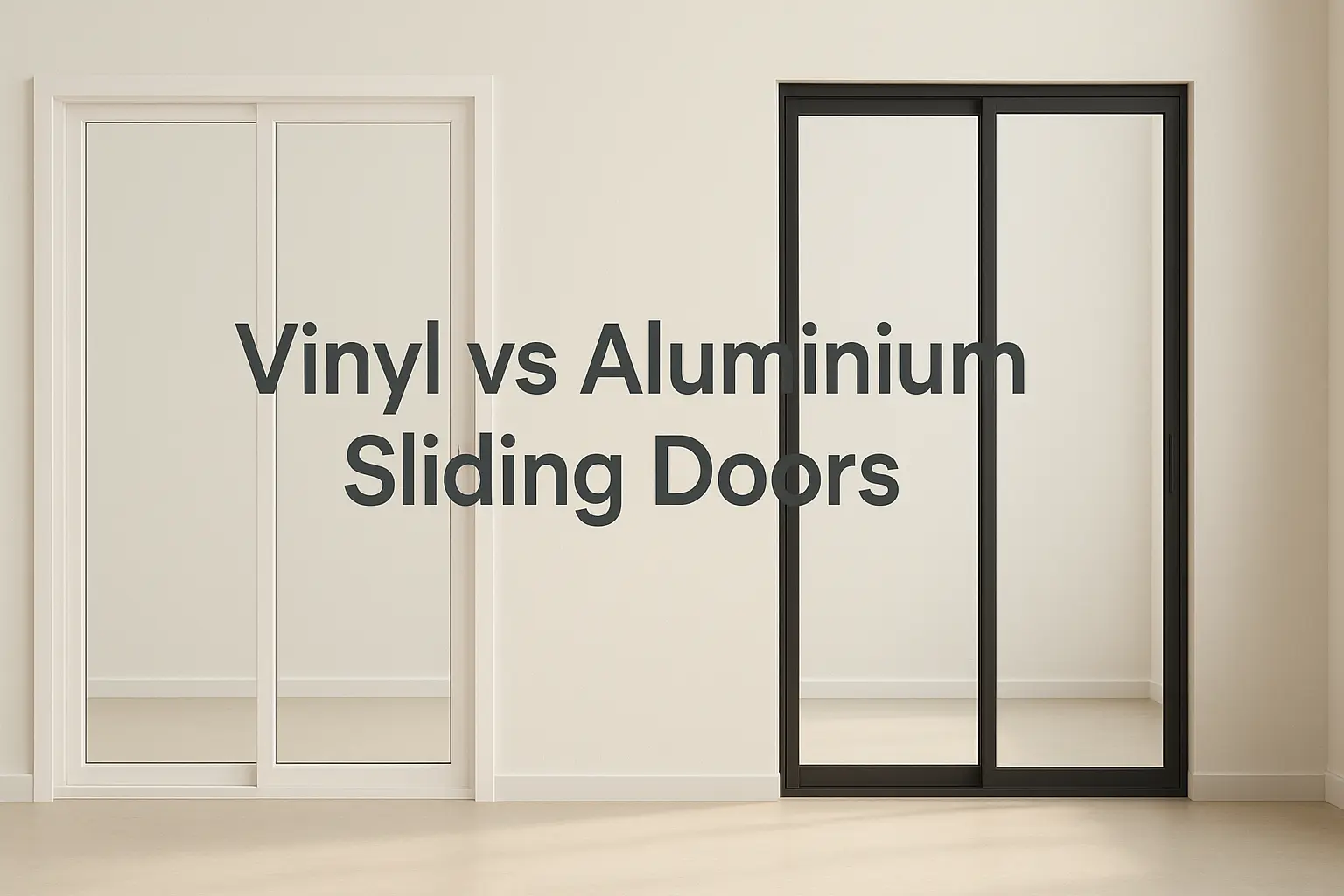Choosing the right material for your sliding doors can make a world of difference in comfort, durability, and energy costs. I’ve learned that each shines in different situations. Let’s break down how they compare and which option fits your home best.

Vinyl sliding doors are made from PVC (polyvinyl chloride), a material known for its affordability and excellent insulation properties. These doors are popular for homeowners seeking a balance between cost, appearance, and energy performance. Vinyl doors come in many colors and finishes, often mimicking wood textures without requiring ongoing maintenance.
Aluminium sliding doors are crafted from lightweight yet strong aluminum frames. They offer a sleek, modern look with thinner profiles that maximize glass area and natural light. Aluminium doors excel in strength and weather resistance, especially in humid or coastal areas, though they tend to be pricier than vinyl.
In my experience, vinyl sliding doors are the best choice if you value energy efficiency and budget-friendliness. They naturally insulate better than aluminum, helping maintain indoor temperatures in colder climates. Vinyl doors are also available in a wide range of colors and designs, which makes them ideal for traditional-style homes.
However, vinyl has its limits. It’s less durable and can become brittle or warp under extreme heat or cold. I’ve noticed this especially in areas with high temperature fluctuations. While vinyl performs well in moderate climates, it might not be the best choice for very hot or coastal regions.
Aluminium sliding doors stand out for their strength, security, and modern aesthetic. They resist corrosion, making them perfect for coastal or humid environments. I’ve found that their sleek, minimal frames create a more open and luxurious look—something vinyl can’t quite match. They also last longer and are less prone to wear or deformation.
On the flip side, aluminium doors cost more upfront and are less energy-efficient unless fitted with thermal breaks. Without these breaks, heat and cold can transfer through the frame, affecting comfort and utility bills. Aluminium can also dent more easily than vinyl, though this rarely affects functionality.
| Feature | Vinyl Sliding Doors | Aluminium Sliding Doors |
|---|---|---|
| Durability | Moderate; can warp in extreme temps | High; strong and long-lasting |
| Energy Efficiency | Excellent insulation | Moderate (better with thermal breaks) |
| Cost | More affordable upfront | Higher initial investment |
| Maintenance | Low | Low to moderate |
| Aesthetic | Traditional look | Modern and sleek |
| Best Climate | Cooler or moderate | Humid or coastal |
If long-term reliability and resistance to corrosion matter most, aluminium clearly wins. I’ve seen aluminium frames stay sturdy for years even near coastal environments.
Vinyl outperforms aluminium in insulation. During winter, vinyl frames retain warmth far better, which can make a noticeable difference in energy bills.
Vinyl doors are easier on the budget and require virtually no maintenance beyond cleaning. Aluminium’s higher cost pays off in durability and modern aesthetics, but the energy efficiency tradeoff should be considered.
For a sleek, contemporary look, aluminium is unbeatable. If you prefer a classic, cozy feel, vinyl’s textures and color variety are appealing.
Cold or variable climates: Vinyl performs best.
Humid or coastal areas: Aluminium resists corrosion and swelling better.
Dry or mild weather: Either material can perform well depending on your style and budget.
Go for vinyl if you’re prioritizing affordability, energy savings, and low maintenance. It’s ideal for families seeking a comfortable, traditional home look without spending too much.
Choose aluminium if you value strength, security, and modern design. It’s especially worth it in coastal or humid climates, or when you want to maximize natural light.
From my own experience, vinyl is perfect for energy-conscious homeowners on a budget, while aluminium is the smart pick for long-term durability and a premium aesthetic. If you can, evaluate the specific climate and style of your home before deciding.
Both vinyl and aluminium sliding doors have their advantages. It’s not about which one is universally “better,” but which one fits your climate, design preference, and budget. Personally, I lean toward vinyl for colder areas and aluminium for humid regions—each shines in its own way.
Vinyl sliding doors, thanks to their natural insulation properties.
Aluminium doors tend to last longer due to their strength and resistance to weather.
Vinyl is usually not paintable, while aluminium can be painted or powder-coated.
Not if they have proper thermal breaks and insulation.



Palm Beach County
Boca Raton, Highland Beach, Delray Beach, Boynton Beach, West Palm Beach, Jupiter, Palm Beach Gardens, Wellington, Palm Springs, Greenacres, Juno Beach Florida
Broward County
Parkland, Pompano Beach, Coral Springs, Coconut Creek, Margate, Deerfield Beach
Are you looking for sliding door repair services? If your sliding door is giving you the trouble we can help.
Perfect Sliding Doors has been in the sliding door business for over 12 years. We know our sliding doors inside and out, and we’ll make sure your sliding door operates smoothly.
Perfect Sliding Doors offers a wide range of sliding door installation and repair services. We’ll help you find the perfect sliding door for your home and provide the best installation and repair services around.
Sliding Doors, and Sliding Door Related Products. We offer the best sliding doors, sliding door installation, and sliding door repair services.